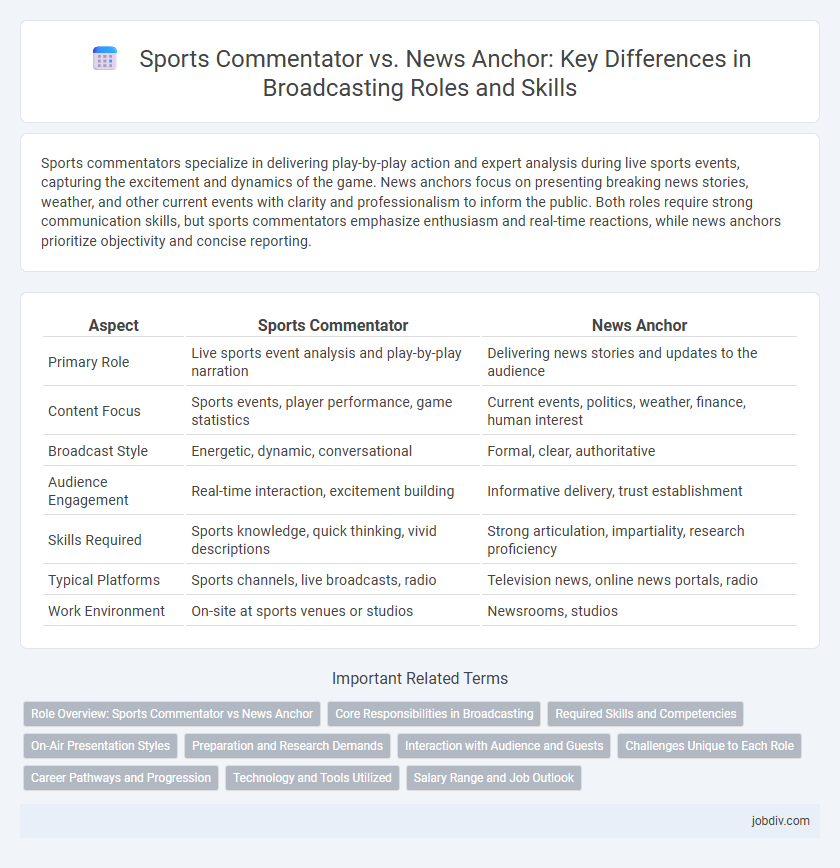Sports commentators specialize in delivering play-by-play action and expert analysis during live sports events, capturing the excitement and dynamics of the game. News anchors focus on presenting breaking news stories, weather, and other current events with clarity and professionalism to inform the public. Both roles require strong communication skills, but sports commentators emphasize enthusiasm and real-time reactions, while news anchors prioritize objectivity and concise reporting.
Table of Comparison
| Aspect | Sports Commentator | News Anchor |
|---|---|---|
| Primary Role | Live sports event analysis and play-by-play narration | Delivering news stories and updates to the audience |
| Content Focus | Sports events, player performance, game statistics | Current events, politics, weather, finance, human interest |
| Broadcast Style | Energetic, dynamic, conversational | Formal, clear, authoritative |
| Audience Engagement | Real-time interaction, excitement building | Informative delivery, trust establishment |
| Skills Required | Sports knowledge, quick thinking, vivid descriptions | Strong articulation, impartiality, research proficiency |
| Typical Platforms | Sports channels, live broadcasts, radio | Television news, online news portals, radio |
| Work Environment | On-site at sports venues or studios | Newsrooms, studios |
Role Overview: Sports Commentator vs News Anchor
Sports commentators provide live, real-time analysis and play-by-play narration during athletic events, focusing on game dynamics, player performance, and audience engagement. News anchors deliver structured, scripted news broadcasts, presenting verified information on current events with an emphasis on clarity, credibility, and professionalism. Both roles require strong communication skills, but sports commentators specialize in spontaneous storytelling, while news anchors prioritize accuracy and impartiality in information delivery.
Core Responsibilities in Broadcasting
Sports commentators specialize in delivering dynamic, real-time narration and analysis of live sporting events, focusing on player performance, game statistics, and audience engagement. News anchors concentrate on presenting daily news stories clearly and objectively, often coordinating with reporters and producers to ensure accurate and timely information dissemination. Both roles require strong communication skills, but sports commentators prioritize entertainment and immediacy, while news anchors emphasize factual reporting and credibility.
Required Skills and Competencies
Sports commentators require in-depth knowledge of specific games, real-time analytical skills, and the ability to engage audiences with vivid storytelling during live events. News anchors must demonstrate exceptional verbal clarity, quick adaptability to breaking news, and strong interviewing abilities to convey information accurately and professionally. Both roles demand excellent communication skills, confidence on camera, and the capacity to connect with the audience effectively.
On-Air Presentation Styles
Sports commentators employ energetic and dynamic on-air presentation styles, utilizing vivid descriptions and enthusiastic tone to engage viewers during live events. News anchors maintain a composed and professional demeanor, delivering information with clarity, neutrality, and precise language suited for factual reporting. The contrast in pacing and emotional expression directly reflects the differing objectives of sports commentary and news broadcasting.
Preparation and Research Demands
Sports commentators require in-depth knowledge of game rules, player statistics, and real-time developments, demanding extensive pre-game research and constant updates during the event. News anchors focus on verifying factual accuracy, understanding current events, and preparing scripts from diverse sources to deliver clear and concise information. Both roles necessitate rigorous preparation but differ in the nature and timing of their research, with sports commentators emphasizing dynamic, live data and news anchors prioritizing verified, broad-spectrum information.
Interaction with Audience and Guests
Sports commentators engage audiences with dynamic storytelling and real-time analysis, creating an immersive experience during live events. They interact with guests such as athletes and coaches through on-the-spot interviews that provide insider perspectives and enhance viewer engagement. News anchors maintain a structured dialogue with panelists or correspondents, focusing on clear, concise communication to deliver factual updates while occasionally addressing audience questions in live broadcasts or social media segments.
Challenges Unique to Each Role
Sports commentators face the challenge of delivering real-time, dynamic analysis while maintaining energy and engagement during fast-paced events, requiring deep knowledge of sports statistics and player performance. News anchors must handle breaking news with accuracy and composure, balancing multiple complex stories under tight deadlines and ensuring clear, unbiased communication to a diverse audience. Both roles demand exceptional verbal skills and the ability to adapt quickly, but sports commentary emphasizes spontaneity and enthusiasm, whereas news anchoring prioritizes precision and credibility.
Career Pathways and Progression
Sports commentators typically begin their careers with internships or entry-level roles in sports media, gradually advancing by building expertise in specific sports and live event coverage, often moving from local radio or online platforms to national broadcasts. News anchors usually start as reporters or junior anchors, gaining experience through diverse newsroom roles before progressing to prime-time anchor positions, with a strong emphasis on versatility across various news beats. Both career pathways require exceptional communication skills, on-camera presence, and the ability to adapt quickly to evolving media technologies and audience preferences.
Technology and Tools Utilized
Sports commentators leverage advanced real-time analytics software and wearable technology to provide dynamic play-by-play insights, enhancing audience engagement through instant replays and augmented reality graphics. News anchors utilize teleprompters, studio automation systems, and integrated social media feeds to deliver timely, coherent broadcasts with seamless transitions and live updates. Both professions increasingly rely on AI-powered tools for content personalization, voice modulation, and automated scripting to optimize broadcast efficiency and viewer experience.
Salary Range and Job Outlook
Sports commentators typically earn between $30,000 and $100,000 annually, with experienced professionals in major markets exceeding $150,000. News anchors have a broader salary range from $40,000 to over $120,000, influenced by market size and network prominence. Job outlook for both roles remains steady, driven by the ongoing demand for live sports coverage and continuous news broadcasting across various media platforms.
Sports Commentator vs News Anchor Infographic

 jobdiv.com
jobdiv.com